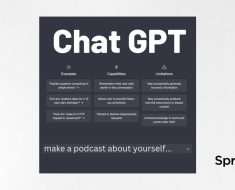
If you’re reading this, you’re probably no stranger to the joys and challenges of parenthood.
Whether you’re a first-time parent or a seasoned pro, you know that parenting comes with its own unique set of trials and tribulations.
But don’t stress, because today, we’re going to chat about some clever strategies for generating parenting advice using ChatGPT.
The Power of ChatGPT
First things first, let’s talk about ChatGPT. It’s an AI language model that’s been trained on a vast amount of text from the internet, making it a veritable treasure trove of information and ideas.
When it comes to parenting advice, ChatGPT can be an invaluable resource. It can help you brainstorm creative solutions to parenting challenges, provide tips on child development, and even offer a sympathetic ear when you need to vent.
Now, let’s dive into some strategies for effectively using ChatGPT to generate parenting advice.
1. Be Specific with Your Prompts
Being specific with your prompts when using ChatGPT is a crucial strategy because it helps you get more relevant and actionable parenting advice.
Here’s why and how to be specific:
Why Be Specific with Your Prompts:
- Precision: Specific prompts provide ChatGPT with a clear understanding of your exact question or concern. This precision enables the AI to generate responses that directly address your issue, making the advice more valuable.
- Efficiency: ChatGPT’s responses are often more helpful when you’re specific because they don’t have to sift through vague or unrelated information. This efficiency saves you time and gets you to the heart of the matter.
- Clarity: Vague prompts can lead to ambiguous responses. By being specific, you reduce the chances of misinterpretation, ensuring that you and ChatGPT are on the same page.
How to Be Specific with Your Prompts:
- Identify Your Parenting Challenge: Start by pinpointing the exact issue or question you’re facing as a parent. Is it related to sleep problems, discipline, school issues, or something else entirely? The more precise you are, the better ChatGPT can assist you.
- Instead of asking, “How do I deal with my child’s behaviour?”, you can ask, “What strategies can I use to handle my 4-year-old’s temper tantrums during bedtime?”
- Include Relevant Details: If your parenting challenge has specific context or factors, include them in your prompt. This helps ChatGPT tailor its advice to your situation.
- For instance, if you’re dealing with a teenager, you might ask, “How can I motivate my 16-year-old to study for exams when they’re easily distracted by their phone and social media?”
- Specify Your Desired Outcome: Clearly state what you hope to achieve with the advice. This can guide ChatGPT in providing solutions that align with your goals.
- You could say, “I want tips on how to encourage my child to develop good reading habits,” instead of a vague request like, “Tell me about reading with kids.”
- Use Action-Oriented Language: Frame your prompts in a way that encourages actionable responses. Ask ChatGPT for practical tips, steps, or strategies that you can implement.
- Instead of saying, “Tell me about raising a well-behaved child,” you can ask, “What daily routines can I establish to promote good behaviour in my 6-year-old?”
By following these guidelines, you ensure that your interactions with ChatGPT are more productive and tailored to your specific parenting needs. Remember, the more precise your prompts, the more valuable the advice you’ll receive, making your parenting journey a bit smoother.
2. Experiment with Different Prompt Styles
Experimenting with different prompt styles when using ChatGPT can add variety and depth to the parenting advice you receive.
Here’s why and how to experiment with various prompt styles:
Why Experiment with Different Prompt Styles:
- Diverse Responses: ChatGPT is capable of generating responses in various styles, including step-by-step guides, listicles, personal anecdotes, and expert advice. Experimenting with different styles can yield diverse and engaging responses that resonate with you.
- Tailored Information: Different prompt styles can help you access information in a format that suits your preferences or the nature of your parenting query. For example, if you prefer structured guidance, a step-by-step guide may be more helpful.
- Engagement: Varying your prompts can make your interactions with ChatGPT more interesting and interactive. It can also help keep the conversation engaging and dynamic.
How to Experiment with Different Prompt Styles:
- Step-by-Step Guides:
- When seeking step-by-step guidance, frame your prompt as a request for a clear and structured plan. For example, “Can you provide a step-by-step plan for introducing solid foods to my baby?”
- Listicles:
- Personal Anecdotes:
- If you enjoy hearing about others’ experiences, you can prompt ChatGPT to share personal anecdotes or stories related to your parenting challenge. For example, “Tell me a funny story about potty training mishaps.”
- Expert Advice:
- To get advice that sounds like it’s coming from an expert, specify that you’d like ChatGPT to provide information in an authoritative manner. For example, “Can you offer expert advice on managing screen time for children?”
- Creative Prompts:
- Get creative with your prompts to spark unique and imaginative responses. For instance, you could say, “Imagine I’m a time-traveling parent from the past. What modern parenting advice would you give me?”
- Interactive Prompts:
- Encourage ChatGPT to participate in brainstorming or problem-solving with you. Collaborate by saying, “Let’s brainstorm some creative ways to make bedtime more enjoyable for my toddler.
- Humor Requests:
- If you want to lighten the mood, ask ChatGPT for parenting-related jokes, funny anecdotes, or humorous perspectives. For example, “Share a parenting joke that will make me smile.”
By experimenting with these different prompt styles, you can tailor your interactions with ChatGPT to suit your preferences and the specific parenting advice you’re seeking. It adds versatility to your conversations and makes the experience more enjoyable and informative.
3. Ask for Expert Opinions
Asking for expert opinions when using ChatGPT is a valuable strategy, especially when seeking well-informed and authoritative parenting advice.
Here’s why and how to ask for expert opinions:
Why Ask for Expert Opinions:
- Credibility: Requesting expert opinions from ChatGPT can lend credibility to the advice you receive. The AI can provide responses that mimic the tone and style of experts in fields such as child psychology, paediatrics, or education.
- In-Depth Knowledge: Experts in various fields have in-depth knowledge and experience. By asking ChatGPT to emulate an expert, you can tap into this wealth of knowledge to address your parenting concerns effectively.
- Trustworthy Guidance: Expert opinions are often based on research, best practices, and years of experience. By seeking expert advice, you’re more likely to receive guidance that’s well-founded and trustworthy.
How to Ask for Expert Opinions:
- Specify Your Request: Be clear in your prompt that you’re seeking expert advice. For example, you can say, “I’d like to receive expert advice on helping my child develop good study habits.”
- Mention the Expertise: If you have a specific area of expertise in mind, mention it in your prompt. For instance, “Can you provide expert guidance from a child psychologist on managing anxiety in children?”
- Ask for Evidence-Based Information: To ensure the advice is grounded in evidence, you can explicitly request evidence-based recommendations. Say, “I’m looking for evidence-based strategies from an expert on improving my child’s reading skills.”
- Use Authoritative Language: Frame your prompt with language that implies expertise. For instance, “Share professional insights on effective discipline strategies for teenagers.”
- Encourage In-Depth Responses: You can also request detailed explanations and reasoning behind the expert’s advice. Ask ChatGPT to provide a thorough understanding of the recommended strategies.
- Ask for Recommendations: Seek expert opinions on recommended resources, such as books, websites, or experts in the field, that can further assist you in your parenting journey.
By asking for expert opinions in this manner, you can access high-quality parenting advice that’s informed by the expertise and knowledge typically associated with professionals in the field. This approach ensures that the advice you receive is well-informed and reliable, making it a valuable resource for your parenting challenges.
Just remember to always use your judgment and consult with qualified professionals when dealing with serious or specific concerns.
4. Utilize Follow-Up Questions
Utilizing follow-up questions is a strategic way to get more detailed and comprehensive parenting advice when using ChatGPT. Here’s an elaboration on why and how to effectively use follow-up questions:
Why Utilize Follow-Up Questions:
- Clarification: Follow-up questions allow you to seek clarification on specific points in the initial response from ChatGPT. If something is unclear or you need more context, this approach can help you get a better understanding.
- Explore Alternatives: You can use follow-up questions to explore alternative solutions or gather more ideas. ChatGPT can provide multiple perspectives or options to address your parenting challenge.
- Deepen the Conversation: By asking follow-up questions, you can delve deeper into a particular aspect of the advice or topic. This can lead to more in-depth insights and recommendations.
- Personalization: Follow-up questions allow you to tailor the advice to your unique situation. You can provide additional details or context, and ChatGPT can respond with advice that’s more specific to your needs.
How to Utilize Follow-Up Questions:
- Ask for Clarification:
- If the initial response is not entirely clear or if you’d like more information about a particular point, you can start with a follow-up question like, “Can you explain that in more detail?”
- Seek Alternatives:
- If you’re looking for alternative approaches, you can ask, “Are there other methods I can consider for handling this situation?”
- Request More Details:
- To deepen your understanding, request additional details. For example, “Could you provide more specific steps for implementing this discipline strategy?”
- Explore Specific Scenarios:
- If you want to apply the advice to a particular scenario, describe the scenario and ask for advice tailored to it. For instance, “How would I apply this approach to a child who is resistant to doing homework?”
- Evaluate Pros and Cons:
- To make an informed decision, ask ChatGPT to outline the pros and cons of a suggested strategy. This can help you weigh the options effectively.
- Discuss Potential Challenges:
- Request Personalization:
- Share specific details about your child or family situation and ask ChatGPT to provide advice that considers these factors. For example, “My child is 7 years old and has a fear of the dark. How can I help them overcome this fear?”
- Explore Real-Life Examples:
- Request real-life examples or anecdotes related to the advice given. Stories can often provide valuable insights and context.
By effectively utilizing follow-up questions, you can engage in a more dynamic and interactive conversation with ChatGPT. This approach allows you to tailor the advice to your specific needs, gain deeper insights, and make more informed decisions in your parenting journey.
Remember that ChatGPT is a versatile tool, but always use your judgment and consult with qualified professionals for serious or specific parenting concerns.
5. Collaborate with ChatGPT
Collaborating with ChatGPT is a fun and interactive way to generate parenting advice while tapping into the creative and problem-solving capabilities of the AI. Here’s an elaboration on why and how to collaborate with ChatGPT:
Why Collaborate with ChatGPT:
- Interactive Engagement: Collaborating with ChatGPT turns the interaction into a dynamic exchange of ideas. It’s like having a brainstorming session with a virtual partner who can offer creative solutions and perspectives.
- Generate Unique Ideas: ChatGPT’s ability to think outside the box can lead to the generation of unique and innovative parenting ideas. It can suggest activities, approaches, or strategies that you might not have considered otherwise.
- Enhanced Problem Solving: When you collaborate, you can present parenting challenges as puzzles to solve together. This approach encourages ChatGPT to think critically and provide tailored solutions.
How to Collaborate with ChatGPT:
- Initiate Collaboration:
- Start by expressing your intention to collaborate. You can say something like, “Let’s work together to find a creative solution to this problem,” or “I’d love to brainstorm some ideas with you.”
- Set the Stage:
- Provide context for the collaboration. Describe the parenting challenge or issue you’re facing in detail so that ChatGPT understands the scenario.
- Engage in Brainstorming:
- Ask open-ended questions that encourage brainstorming. For example, “What are some innovative ways to make learning fun for my child?” or “Let’s come up with creative ways to manage screen time.
- Build on Ideas:
- When ChatGPT suggests ideas, build on them. Say, “I like that idea! How can we make it even more engaging?” or “Let’s expand on this concept.”
- Explore Scenarios:
- Pose hypothetical scenarios related to your parenting challenge and ask ChatGPT to brainstorm solutions for those scenarios. For instance, “Imagine we’re planning a family trip with young kids. What are some tips for a smooth journey?”
- Encourage Problem-Solving:
- If you’re facing a specific problem, present it as a challenge to be solved collaboratively. Ask, “How can we tackle this issue together?” or “Let’s figure out how to handle bedtime routines more efficiently.”
- Celebrate Creativity:
- Acknowledge and celebrate creative and innovative ideas that ChatGPT comes up with. Encourage the generation of out-of-the-box solutions.
- Evaluate and Discuss:
- After generating ideas, take some time to evaluate and discuss the feasibility and effectiveness of the suggestions. This can help you refine and select the best strategies.
Collaborating with ChatGPT can be a delightful way to approach parenting challenges with a fresh perspective. It encourages creativity, problem-solving, and a sense of partnership in finding solutions.
Keep in mind that while ChatGPT can provide creative and imaginative ideas, it’s essential to use your judgment and adapt these ideas to your specific family circumstances.
Collaborative brainstorming with ChatGPT can be a valuable addition to your parenting toolkit, offering innovative solutions to everyday challenges.
6. Keep a Sense of Humour
Maintaining a sense of humour while using ChatGPT for parenting advice can make the experience more enjoyable, reduce stress, and add a light-hearted touch to your interactions. Here’s an elaboration on why and how to keep a sense of humour:
Why Keep a Sense of Humour:
- Stress Reduction: Parenting can be stressful, and a good laugh can act as a natural stress reliever. When you inject humour into your interactions with ChatGPT, it can lighten the mood and make you feel more relaxed.
- Bonding: Sharing humour can create a sense of camaraderie with ChatGPT. It turns the AI into a virtual companion who can provide both advice and a good chuckle.
- Positive Perspective: Humour can help you maintain a positive perspective on the challenges of parenthood. It reminds you that it’s okay to make mistakes and that laughter can be the best remedy.
How to Keep a Sense of Humour:
- Request Jokes:
- Ask ChatGPT to share parenting-related jokes or humorous anecdotes. For example, you can say, “Tell me a parenting joke that will make me smile.”
- Share Funny Stories:
- Share your own funny parenting stories with ChatGPT and ask for its take on them. This can lead to amusing exchanges and mutual laughter.
- Inject Humor into Questions:
- Frame your parenting questions in a humorous way. For instance, “How can I convince my toddler that broccoli is a superhero vegetable?”
- Embrace Playfulness:
- Be playful in your interactions with ChatGPT. You can say things like, “Let’s imagine we’re superheroes on a mission to conquer the laundry pile. What’s our strategy?”
- Laugh at Parenting Mishaps:
- Share parenting mishaps or humorous situations you’ve experienced, and ask ChatGPT how it would handle them. This can lead to entertaining and creative responses.
- Celebrate Small Wins:
- Celebrate even the small victories in parenting with a sense of humor. For example, “My child finally tied their shoelaces! Time to throw a mini celebration.”
- Use Light-hearted Language:
- Frame your prompts and responses with light-hearted language. Injecting humor into the conversation can set a cheerful tone.
- Appreciate the Absurd:
- Embrace the absurdity of some parenting situations. ChatGPT can play along with humorous scenarios, like imagining a superhero baby who battles diaper disasters.
Remember that humour is a personal and subjective thing, so feel free to tailor it to your own style and preferences.
While keeping a sense of humour is a great way to cope with the challenges of parenting, it’s important to strike a balance and recognize when a situation calls for a more serious or thoughtful approach.
Ultimately, laughter is a fantastic tool to have in your parenting toolbox, and ChatGPT can be a willing partner in keeping your parenting journey light-hearted and enjoyable.
7. Share Your Personal Experiences
Sharing your personal experiences when seeking parenting advice from ChatGPT can add a personal touch to the interaction and provide the AI with context to offer more relevant and empathetic advice.
Here’s how you can share your personal experiences:
Why Share Your Personal Experiences:
- Contextual Advice: Sharing your personal experiences allows ChatGPT to understand the specific challenges you’ve faced as a parent. This context can lead to advice that’s tailored to your unique situation.
- Relatability: By sharing your experiences, you create a sense of relatability with ChatGPT. It can respond with empathy and relate to the ups and downs of parenthood, making the interaction feel more personal.
- Problem Solving: Personal anecdotes can serve as real-life scenarios that ChatGPT can use to suggest practical solutions. It can draw from your experiences to provide advice on similar issues.
- Foster Conversation: Sharing your stories can lead to engaging and insightful conversations with ChatGPT. You can discuss your experiences, ask for advice based on them, and explore different perspectives.
How to Share Your Personal Experiences:
- Set the Context:
- Start by providing a brief overview of the parenting situation or challenge you’ve faced. For example, “I’ve been struggling with getting my child to eat vegetables.”
- Describe the Experience:
- Share the details of your personal experience. Explain what happened, how you handled it, and the outcomes, if any. Be honest and open about the challenges you encountered.
- Ask for Advice:
- After describing your experience, you can ask ChatGPT for advice based on your specific situation. For instance, “Based on my experience, what strategies do you think could help with this eating issue?”
- Seek Empathy:
- Express your emotions and feelings related to the experience. ChatGPT can respond with empathetic and supportive messages. For example, “It’s been quite frustrating, and I could use some guidance.”
- Explore Alternative Approaches:
- Discuss Lessons Learned:
- Share Success Stories:
- Don’t forget to share your parenting success stories or moments of pride. Celebrating your wins can be inspiring and uplifting.
- Ask for Encouragement:
Sharing your personal experiences with ChatGPT can create a more personalized and relatable interaction. It allows the AI to provide advice that takes into account your journey as a parent.
In addition, it can foster a sense of connection and understanding, making your conversations more meaningful and supportive.
Even though ChatGPT can offer insights based on your experiences, always remember that it’s essential to consult with qualified professionals for specific or serious parenting concerns.
8. Stay Informed About Child Development
Staying informed about child development is a fundamental aspect of effective parenting. It allows you to understand your child’s growth, behaviour, and needs, and it provides a solid foundation for making informed parenting decisions.
Here’s how to stay informed about child development:
Why Stay Informed About Child Development:
- Informed Decision-Making: When you have knowledge about child development, you can make informed decisions about your child’s education, health, and overall well-being. You’ll be better equipped to choose appropriate activities, set realistic expectations, and make parenting choices that align with your child’s developmental stage.
- Effective Communication: Understanding child development helps you communicate more effectively with your child. You can tailor your communication style to their age and developmental level, fostering better understanding and cooperation.
- Recognize Milestones: Being informed allows you to recognize and celebrate important developmental milestones. You’ll know when your child is expected to achieve certain skills, which can be a source of pride and encouragement.
- Early Intervention: Knowledge of child development can help you identify potential issues or delays early on. If you notice developmental concerns, you can seek professional help or interventions sooner, improving your child’s chances of success.
How to Stay Informed About Child Development:
- Read Books and Articles:
- Explore books, articles, and blogs on child development. Look for trusted sources and authors who provide accurate and up-to-date information on various developmental stages.
- Attend Parenting Workshops and Classes:
- Many communities offer parenting workshops and classes that cover child development topics. These can be valuable sources of information and provide opportunities to connect with other parents.
- Consult Reliable Websites:
- Subscribe to Parenting Magazines:
- Join Parenting Forums and Groups:
- Online parenting forums and social media groups can be a great way to exchange information and experiences with other parents. Just ensure that the information you gather is from reliable sources.
- Consult Pediatricians and Child Psychologists:
- Regularly check in with your child’s pediatrician or a child psychologist for guidance on developmental milestones and concerns. They can provide personalized advice based on your child’s unique needs.
- Participate in Child’s School Activities:
- If your child is in school, engage with their teachers and school activities. Attend parent-teacher meetings to gain insights into your child’s academic and social development.
- Read Academic Journals (Optional):
- For those interested in a deeper understanding of child development, academic journals and research papers in the field of child psychology and education can provide in-depth insights.
- Seek Recommendations:
- Ask fellow parents, friends, or family members for book and resource recommendations related to child development. Personal recommendations can lead you to valuable sources.
- Stay Updated:
- Child development is an evolving field. Stay updated with the latest research and trends to ensure you have the most current information.
Staying informed about child development is an ongoing process that can benefit both you and your child. It empowers you to be a more effective and supportive parent, capable of providing the guidance and care your child needs at each stage of their development.
Remember that every child is unique, so while general developmental guidelines are helpful, it’s essential to recognize and respect your child’s individuality and pace of growth.
9. Filter and Evaluate the Advice
Filtering and evaluating the advice you receive, whether from ChatGPT or any other source, is a critical aspect of effective parenting. Here’s an elaboration on why and how to filter and evaluate parenting advice:
Why Filter and Evaluate the Advice:
- Customization: Not all advice is one-size-fits-all. Each child and family is unique, and what works for one may not work for another. Filtering and evaluating advice allows you to tailor it to your specific circumstances.
- Safety: Safety is a top priority in parenting. By evaluating advice, you can ensure that it aligns with safety guidelines and doesn’t pose any risks to your child.
- Alignment with Values: Parenting often involves making decisions that align with your family’s values and beliefs. Evaluating advice helps you choose approaches that resonate with your principles.
- Effectiveness: Not all advice is equally effective. Some strategies may be backed by research and evidence, while others may lack a proven track record. Evaluating advice helps you select methods that are more likely to yield positive results.
How to Filter and Evaluate the Advice:
- Consider the Source:
- Start by evaluating the credibility of the source of the advice. Is it from a trusted parenting expert, a reputable organization, or a reliable publication? Be cautious with advice from unverified or questionable sources.
- Check for Evidence:
- Look for advice that is backed by research or evidence. Scientific studies and expert recommendations can carry more weight than anecdotal accounts.
- Assess Safety:
- Prioritize your child’s safety. Ensure that the advice doesn’t pose any physical or emotional harm to your child. If in doubt, consult with a pediatrician or child psychologist.
- Consider Your Child’s Individuality:
- Keep in mind that what works for one child may not work for another. Consider your child’s personality, preferences, and needs when evaluating advice.
- Reflect on Your Values:
- Determine whether the advice aligns with your family’s values and principles. If it contradicts your beliefs or feels uncomfortable, it may not be the right fit.
- Seek Multiple Perspectives:
- Gather advice from multiple sources to gain a well-rounded perspective. This can help you make more informed decisions by considering various viewpoints.
- Evaluate Practicality:
- Assess the practicality and feasibility of implementing the advice in your daily life. Consider your resources, time, and energy when deciding if a particular strategy is doable.
- Trial and Observation:
- Experiment with the advice and observe its impact on your child. Keep in mind that some strategies may take time to show results, so be patient in your evaluation.
- Consult with Experts:
- When dealing with specific or complex issues, consult with experts such as pediatricians, child psychologists, or child development specialists. They can provide professional guidance tailored to your situation.
- Trust Your Parenting Instincts:
- Ultimately, trust your instincts as a parent. You know your child better than anyone else, and your intuition plays a vital role in decision-making.
- Be Open to Adaptation:
- Parenting is a dynamic journey. Be open to adapting your approach based on your child’s changing needs and your evolving understanding of parenting.
Filtering and evaluating advice is an essential skill for parents, helping you make informed decisions that are in the best interests of your child and family.
Remember that there’s no one-size-fits-all solution in parenting, and it’s okay to seek advice while also trusting your judgment and instincts as a parent.
10. Stay Patient and Positive
Parenting is a journey filled with ups and downs, and there’s no one-size-fits-all solution to every challenge. ChatGPT can provide guidance and ideas, but ultimately, your instincts as a parent are invaluable.
Stay patient, stay positive, and remember that you’re doing your best.
ChatGPT is a powerful tool for generating parenting advice, and with the right strategies, you can make the most of its capabilities.
Be specific with your prompts, experiment with different styles, ask for expert opinions, utilize follow-up questions, collaborate with ChatGPT, keep a sense of humour, share your experiences, stay informed about child development, filter and evaluate the advice, and most importantly, stay patient and positive.
Parenthood is an incredible journey, and with ChatGPT by your side, you’ll have a valuable resource to help you navigate the twists and turns along the way.
So go ahead, ask ChatGPT for some parenting advice, and let the adventure continue!





